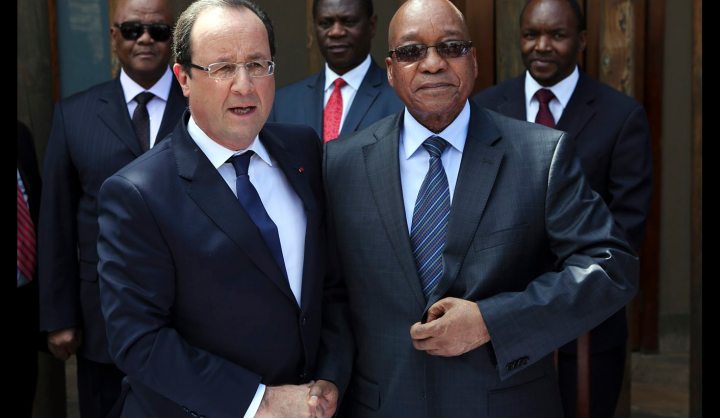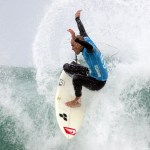World
Francois Hollande visit: mopping up Sarkozy’s mess

French President Francois Hollande has been making amends for the follies of his predecessor during his state visit to South Africa. By KHADIJA PATEL.
On Monday, French President, Francois Hollande, called on President Jacob Zuma at the Union Buildings. “Our two nations will nurture the present relationship and build towards our vision of a prosperous South Africa, a peaceful Africa and a better world,” Zuma said.
The two leaders signed a number of agreements, smiled for the cameras, shepherded business delegations and generally seemed to be getting along very well.
Hollande warmly recalled South Africa’s support for the French intervention in Mali earlier this year. “I don’t forget the support shown by Zuma when we intervened in Mali,” he said, proving that Zuma has enjoyed a far more cordial relationship with Hollande than he did with former French president, Nicholas Sarkozy.
Zuma was more receptive to French intervention in Mali than he was of French intervention in Cote d’Ivoire.
Deputy Minister of International Relations and Co-Operation, Ebrahim Ebrahim, in reconciling the difference in South Africa’s stance on French intervention in Cote d’Ivoire and Mali in January, said one key difference between Mali and Cote d’Ivoire was that Hollande had telephoned Zuma to ask his opinion and inform him about the French plans in Mali.
“Sarkozy did not ring our president to inform him [of his plans in Cote d’Ivoire],” Ebrahim said.
David Hornsby, a lecturer in international relations at the University of Witwatersrand says, “Nicholas Sarkozy wasn’t an easy person to get along with at the best of times.”
He believes Hollande, as a socialist, understands the ethos of the ANC and what they are trying to do.
“For Zuma and Hollande it’s a much more natural pairing than Sarkozy and Zuma.” Hornsby says.
And certainly Zuma’s reaction to French intervention under Hollande in Mali was a far cry from his government’s reaction to French intervention in Cote d’Ivoire in 2011 under Sarkozy.
It was the intervention in Cote d’Ivoire that was said to have inspired the Department of International Relations and Co-Operation to nominate a South African to take over the reins of the African Union Commission, further fuelling speculation that positioned South Africa and France as rivals for influence over the African continent to further the ambition of their respective foreign policies.
Imad Mesdoua, a political analyst at Pasco Risk Management in London, says the uproar over a rivalry between France and South Africa for influence in French-speaking Africa is misplaced.
“I don’t see France and South Africa being rivals on anything. I think if anything there’s more rivalry between South Africa and Nigeria than there is between South Africa and France,” he said.
“On top of the important economic side of the relationship [between France and South Africa], Hollande is also here to say, ‘Hey South Africa, you guys are leaders on the continent, you are in charge of a lot of institutions, help us out here and maybe we can talk about specific hotspots where the AU or you could step up’,” Hornsby says.
Hornsby believes France is trying to influence South Africa to play a more prominent role in resolving conflicts in Africa.
And certainly to this end, Hollande’s announcement of an African security summit in Paris in December is meant to promote the formation of African peacekeeping forces that can intervene in regional conflicts.
“France’s role is not to substitute (an African force), but to assist, support, and train,” Hollande said.
President Zuma will attend the summit in Paris on December 6-7.
“The idea is to promote the creation of regional African forces having the ability to intervene at the right time, with the decisions to be taken at the AU and UN,” Hollande said.
The French president also reiterated his commitment to increasing the number of troops in the Central African Republic under a UN resolution to help prevent any further conflict there.
France, however, will be reluctant to be saddled with yet another African conflict. While President Zuma agreed intervention in CAR was needed, he stopped short of saying South Africa would again send troops to Bangui.
“For France to continue intervening isn’t politically, or economically feasible,” Hornsby says adding, “It would be in France’s interests right now to have African solutions to African problems.”
Mesdoua predicts that, “If there is competition, it’s going to be among Africans as opposed to Africans and Europe.”
He says the announcement of the December summit is all geared towards improving France’s image on the continent.
“I think all this rhetoric and this visit to South Africa is Francois Hollande trying to show that his government, the socialist government, is not trying to take France down an image of an interventionist country or an imperialist country,” Mesdoua says.
“France’s image has been tarnished by the previous administration’s all-out interventionist policy in Africa, especially in 2011, you had France intervening in various conflicts throughout Africa. You had the Cote d’Ivoire intervention, you had Libya, obviously and more recently you had Mali.
“There were those allegations of ‘France Afrique’ which holds that France is still holding a lot of sway in some of its former colonies.”
Mesdoua points out, “Most of those allegations actually came from South Africa, from South African diplomats, who were very wary of that.”
Hollande then has come to South Africa to diffuse some of the tensions that may have taken root during Sarkozy’s term in office.
South Africa is not likely to shrink away from the French overtures inviting greater South African input into African security issues.
“South African foreign policy has always between about SA being a bridge between Africa and the rest of the world so I think SA being the interlocutor here, being the responsible kid in the playground does serve SA’s foreign policy interests,” Hornsby says.
And of course it serves the economic interests too.
“France is a very big trading partner to South Africa,” he points out.
Hornbsy describes Hollande’s trip as an opportunity for both Zuma and Hollande to “maximise” their existing relationship.
And Mesdoua says that over and above the critically important deals that will be cemented with Hollande’s trip, the opportunity to ensure “that at least publicly France and South Africa are on the same page when it comes to things like Mali, when it comes to things like co-operation in CAR, the mediation in Zimbabwe” will go some way to making Hollande’s trip to South Africa worth his while.
He believes that Hollande’s trip to South Africa would be deemed successful if “his South African counterparts feel like they are on the same page and that their role as an African powerhouse, an African leader, is respected.”
By those standards President Zuma will certainly not mind having Hollande over again. DM
Photo: French President Francois Hollande (L) embraces South Africa’s President Jacob Zuma after Hollande placed a wreath at the Freedom Park in Pretoria October 14, 2013. REUTERS/Siphiwe Sibeko



















 Become an Insider
Become an Insider